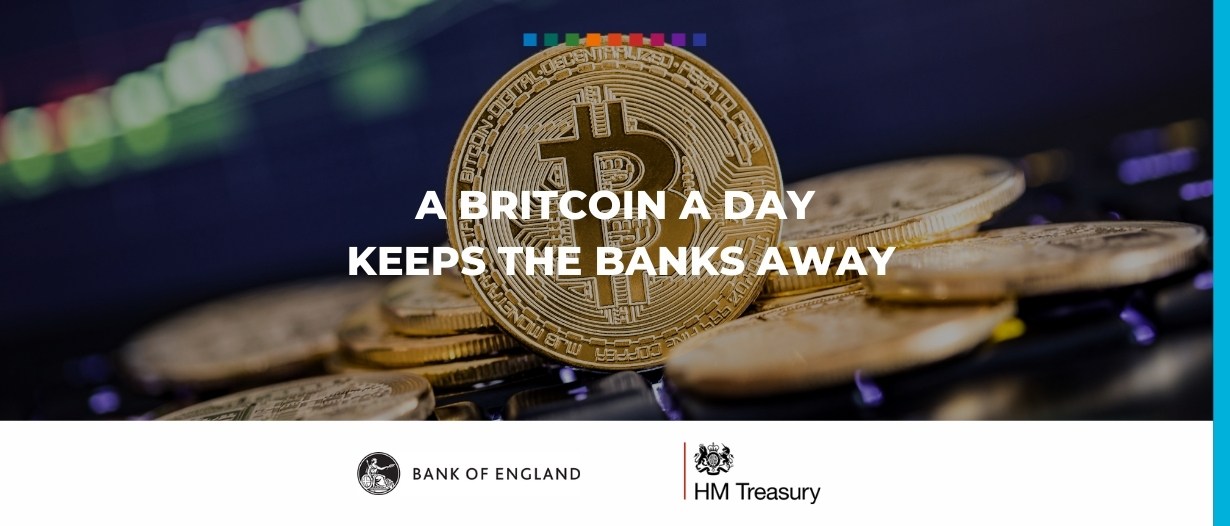If you are familiar with the concept of cryptocurrency, you have probably heard of something called Bitcoin.
As the world’s first cryptocurrency, Bitcoin has gained both tremendous value and popularity over the last few years, making its way into countless news headlines and investment portfolios.
But while enthusiasts hail Bitcoin’s revolutionary prowess, many are probably unaware of Bitcoin’s latest rival emanating from Britain: the ‘Britcoin’.
What is Britcoin?
Britcoin is the nickname given to the central bank digital currency (CBDC) that is being explored for use in the UK.
In April this year, the Bank of England (BoE) and the Treasury launched a joint taskforce to explore the possibility of introducing a CBDC.
In case you missed it, we’re exploring the potential benefits, risks and practicalities of a Central Bank Digital Currency.
— Bank of England (@bankofengland) April 3, 2020
Join our webinar at 10am on Tuesday 7 April to learn more. Sign up now. https://t.co/1iK1jGpChu pic.twitter.com/rIU0iiP9QY
Yet, despite being on the BoE’s radar for quite some time now, no formal decision has been made as to whether Britcoin will be implemented at all.
And if the BoE and the Treasury decide to proceed with Britcoin, they have said it will not launch until 2025 at the earliest.
Which gives us plenty of time to dive in and learn a little bit more about what this will mean for the British economy.
What are central bank digital currencies (CBDCs)?
All this talk about CBDCs might have you wondering, just what exactly is a central bank digital currency?
CBDC’s can be defined as money that a central bank creates in electronic form for the general public, which can be used as legal tender alongside other forms of central bank money.
Since these digital tokens are issued by a nation’s monetary authority or central bank, they are backed only by the faith and credit of the issuing government, much like the fiat money you have in your bank account today.
Many people think of CBDCs as a cryptocurrency that is run by the government, and although the two concepts do have similarities, their differences are much more numerous and consequential.
The most important difference is that, in the case of CBDCs, the central bank that issues the tokens can retain total control over when, where, and how they are used, as well as how many tokens are issued.
This is quite different from Bitcoin and many other cryptocurrencies, where the total supply of tokens is fixed from the outset, and is built into the underlying source code of the protocol.
Many in the crypto community would balk at the idea of giving such a high degree of control to a centralised entity, but the CBDC system of centralised control would, in some ways, be quite similar to the current fiat system.
Today, central banks use monetary policy to manipulate the supply of money in an economy, in an effort to control inflation and employment, and to help protect their nations from economic disasters.
The only difference with CBDCs is that, rather than having to print those weird paper banknotes that grandma always puts in your birthday card, the central bank could control the money supply with a few clicks of a mouse.
Why is the UK considering a CBDC?
Governments around the world are exploring the potential that CBDCs could have in their economies, and the UK is no different.
The biggest reason for the governments’ interest in CBDCs is the rise of Bitcoin and other cryptocurrencies.
As the popularity of cryptocurrency continues to surge, and increasingly more mainstream firms and institutions incorporate the digital coins into their operations, fiat currencies and central banks are starting to feel the pressure.
Individuals and companies are shifting away from using cash, and central banks want to ensure that they retain some control over the monetary innovations that are taking place within their borders.
As mentioned, by using a CBDC, a central bank would be able to track all of the digital currency it issues in real-time.
On the one hand, this may seem like a Machiavellian mechanism for destroying individual privacy, but on the other, it would provide governments with an effective tool to combat financial crime and money laundering.
John Glen, the UK’s economic secretary to the Treasury, has said that retail CBDCs could be used by people and businesses for their everyday payment needs, and could help Britain stay at the forefront of financial technology and innovation.

Britcoin’s impact on commercial banks
Unfortunately for Britain’s commercial banks, it might not be all sunshine and moonshots for Britcoin.
This week, at a House of Lords Economic Affairs Committee hearing on CBDCs, Sir Jon Cunliffe, deputy governor for financial stability at the Bank of England, revealed some interesting findings on the potential impacts of Britcoin.
Based on current assumptions, Cunliffe said the Bank of England expects that, should the UK issue a CBDC, then commercial banks would lose 20% of their commercial and retail bank deposits, and will therefore likely lose 20 basis points of credit spreads.
“The honest answer is that we do not know what the demand would be for digital Bank of England money,” Cunliffe told the committee.
“We are trying to estimate demand for something that does not exist at the moment. We have to be quite humble in how we deal with that.
“We have modelled a very prudent assumption, which is that 20% of the deposit base in the banking system could move out of the banking system into central bank digital money in some form or other.”
This would be possible because a CBDC would allow some clients of commercial banks to deal directly with the central bank.
Without the need to go through a commercial bank, merchants would be able to avoid the heavy transaction fees that are often levied by these incumbent intermediaries.
With Britcoin, or with any other CBDC, each individual citizen, household, or corporation could securely possess a central bank-backed currency in their own digital wallet.
While this would not eliminate the need for banks entirely, it would reduce our reliance on them.
Sir Jon Cunliffe from the @bankofengland: “The Bank of England is going to continue to make cash available for as long as there is demand for it. We’re working closely with the Treasury on ensuring that there will be access to cash.” #CBDC inquiry
— Lords Economic Affairs Committee (@LordsEconCom) November 23, 2021
In today’s world, you are not very likely to keep a large stack of physical cash tucked away in your mattress – you would instead put it in a bank where it will be kept safe.
But with a digital wallet, your CBDC is already safe.
Many individuals and institutions would therefore prefer to avoid the high fees of using a bank account, and would opt to hold Britcoin in their fully secure and 24/7 accessible digital wallet instead.
But inevitably, this would take a large chunk out of commercial bank revenues in the process.
What’s in store for Britcoin?
If the UK decides to move forward with Britcoin, commercial banks in the country will need to take a serious look at their business model to stay relevant and profitable in this new paradigm.
In the coming months, banks, corporations, and individuals alike will have their eyes on the Bank of England and the Treasury, to see what decision the task force comes to regarding the future of Britcoin.
























